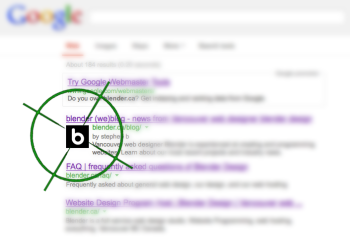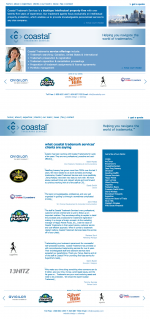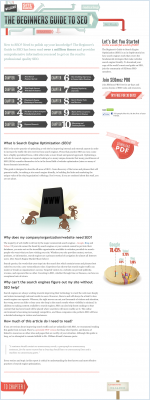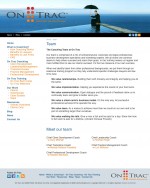SEO and expired content
Properly dealing with expired content is important. I have a few clients who regularly update their website and remove content that is dated or obsolete. Usually I notice the content is missing and send them an email along the lines of “never remove content!” along with some explanation. But is just keeps happening, and it is hurting their visitors experience and their website’s search engine ranking.
The concern with removing expired content, or not removing it, is that visitors will continue to come to your website, directed by search engines and outside links, and will not find what they are looking for. Either what they wanted is missing, or it is old and out of date. You have just made a bad impression. Further, search engines are in the business of directing visitors to useful content. If they detect that sending visitors your way isn’t helpful they will rank you lower in their search results. Search engines want the pages and content they think you have to be stable and reliable. So what to do? (more…)
SEO + CMS website launch
Just launched: Vancouver trademark agents CoastalIP.com. This exciting project focused on a website design that was search engine (SEO) friendly and user maintained with a content management system (CMS). The project lead was Creating Excellence who gets credit for the layout and content.
Blender took their design and created WordPress based website, our chosen CMS platform. Careful attention was taken to make the template adaptable so the website can grow. New pages can easily be added, posts to the blog, client logos to the site footer.
The site is also designed for a targeted SEO campaign. Specific key phrases were researched and the site ensures these feature prominently for google and other search engines to index.
CoastalIP.com is the lastest in a series of websites Blender has launched with Creating Excellence, and we have another in production. Looking forward to many more!
Technologies used: WordPress CMS, jQuery Javascript Library, HTML 5
Visit Trademark Agents — coastalip.com
Site credits:
Layout, Design, and Marketing — creatingexcellence.ca
Build and Programming — Blender
Photography — photosbykathryn.com
SEO Directory Submission Targets
SEO promotion of your website must consider both factors inside your website, the design of your website, and outside on websites that refer to you. Search engines will look at where your website exists in the internet — who is linking to you and how reputable are they. These are called back-links.
Good quality back-links require a little work, but are worthwhile. One source for back-links are website directories. They will list your website and a description. There are better types of back-links, but directories are cheap (free) and easy. You do, however, need a lot of them. There are services that can submit your site automatically for a fee, and you can also pay these directories to prioritize your listing. Just be ready with your website’s address, title, and description.
This VERY long list has more directories than you could ever need. PR refers to PageRank and is a measure of the directories reputation.
4 Reasons Your Website Fails To Convert
Web Design Digest lists 4 reasons your great looking website isn’t generating any heat — targeted landing pages, clear call-to-action, direct homepage, and personal connection.
SEO for Beginners
SEOMoz have created a great beginners guide to SEO. I recommend all my clients read this guide, especially the chapters on growing in bound links and keyword research. This guide will help you to understand what I am talking about…
Website (re)Design ~ On Trac Coaching
Longtime client Gary Mitchell first hired Blender in 2006. He recently wanted to update and re-brand the website for his core business GEM Communications. His existing website was dated, performed poorly from a Search Engine Optimization (SEO) standpoint, and used technologies such as Flash which are no longer suitable for general website design. Gary wanted a modern website that would give him all the advantages the internet offers.
Our redesign stayed true to the appearance of the old, but completely replaced the foundation and back end. Blender recommended using the WordPress Content Management System (CMS) so that Gary could maintain the content of On Trac on his own ensuring his website was always up to date. WordPress offers well structured web pages where search engines are concerned and scales well to any size website.
Another focus was an expansion into social media including LinkedIn, Facebook, and Twitter. On Trac would have a presence on all three with the website acting as a hub from which content would be shared out.
The success of the re-design will be tracked using integrated Google Analytics for traffic monitoring. Visitors can give feedback through website feedback forms, a blog post comment system, and through social media integration.
Technologies: WordPress, PHP, CSS, Javascript, jQuery
Visit On Trac Coaching
SEO Experiment ~ Hubpages
For search engine optimization (SEO) an important factor considered by search engines is inbound links — links from other webpages. The best link is one from another website who does not link back to you AND has not designated the link as ‘nofollow’. A nofollow designation tells search engines that the link is either paid or somehow solicited or affiliated. Often these links will happen naturally over time with good content, but what if you are in a hurry? Although at first glance it would seem easy to arrange these links, in practice it can be difficult and time consuming. Especially for really good links.
One way to create our links is to author content on blogs or other community based websites. One such website is Hubpages where you can author your own articles with outgoing links. The catch is that initially your outgoing links are nofollow, but once you achieve a certain level of credibility with Hubpages your links lose this designation.
I am now 12 days in on an SEO experiment on Hubpages. My ‘hubber’ author rating has passed 75/100 at which point the links in the articles I wrote lost their ‘nofollow’ designation. No news yet on whether this is helping my website in terms of SEO, but it is early days. My concern at the moment is my hubber rating peaked at 82 and has since dropped to 78 … must maintain that 75 rating! To achieve my hubber rating I wrote two articles, both original and full of great content. I also read some other authors hubs and made some comments on their work.
You can find links to my Hubpages in my Facebook and Twitter feeds. Don’t want to link to Hubpages here though!





